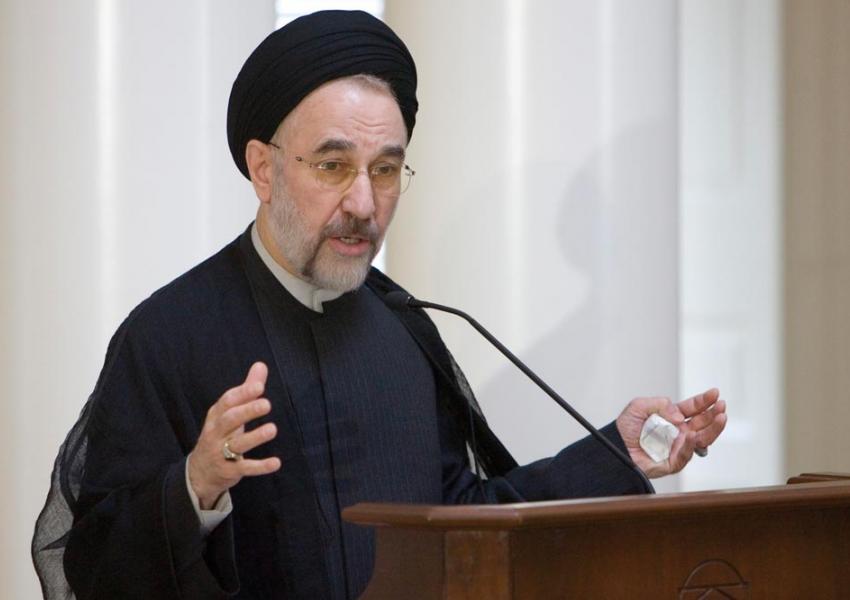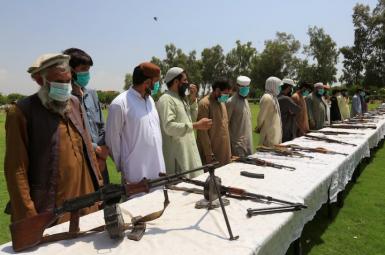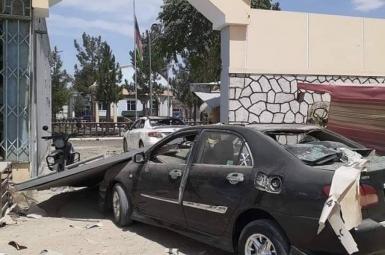
Iran Reformists And Principlists Trade Barbs Over Afghanistan
Former reformist President Mohammad Khatami in a statement Friday joined the discussion over Iran’s approach to Afghanistan by suggesting the make-up of the Taliban interim cabinet showed it was "unreasonable" to expect the movement to change.
Khatami’s opposition to “foreign interference” apparently responded to principlists mocking reformists for suggesting Iran should support the National Resistance Front (NRF), which says it continues to fight the Taliban in Panjshir province.
Mocking the reformists in an editorial September 9, Hossein Shariatmadari, editor of the flagship principlist newspaper Kayhan, wrote that there was no need for official sanction for a "reformists brigade" to fight in Afghanistan. Shariatmadari took a dig at his opponents by contrasting their alarm over the Taliban with their qualms over Iran’s military role in Syria and Iraq against the Islamic State group (Isis, Daesh).
"Now that the United States has been disgracefully defeated in Afghanistan, the western-oriented political faction … is crying out why we are not going to war against the Taliban and in favor of the United States,” Shariatmadari noted. The editor argued Iran’s approach was “prudent and clear: opposing foreign intervention and supporting a national government based on the votes of all ethnicities and religions,” an approach he said Tehran followed in Iraq, Lebanon, Palestine and Syria, where Iranian forces had operated in an “advisory” capacity.
Mojtaba Zolnuri, a member of the parliamentary Security and Foreign Policy Committee, said September 10 he would remove any impediments standing in the way of reformists going to fight against the Taliban.
Iran’s position – in broad outline shared with Russia, China, Qatar, and to a lesser extent Pakistan – has been to call for the Taliban to establish an inclusive government, dampen Shia-Sunni tensions, to withhold recognition of the new authorities in Kabul, and to monitor the situation. All tacitly share the US view, encapsulated in President Donald Trump’s 2020 agreement over US withdrawal, that a stable Taliban government is preferable to any haven for groups like Isis.
While many Iranian principlists see the Taliban simply as a reality Iran has to deal with, some have shown more sympathy. State media described the Taliban takeover of Kabul as a "victory against the United States" and has not widely reported NRF claims to be continuing the war in Panjshir province.
Some principlists have circulated on social media photos showing Ahmad Massoud, the NRF leader, with Bernard-Henri Levy, the controversial French intellectual as proof that Massoud is a Zionist and a lackey of the West.
Reports of violence against Afghan Shiites have shifted the mood. According to Fararu, a conservative news website, the state television reported “resistance” in Panjshir on September 4 for the very first time after the Taliban’s claim to control all the country.
In a statement September 6, Iran's Reforms Front said there was a “danger of ethnic cleansing in Afghanistan and Panjshir” and urged the government to form “a crisis taskforce” for "diplomatic management of Afghan policy".
Reformists say they do not advocate Iran's military assistance to the NRF. The secretary-general of the reformist Mardomsalari (democracy) Party Mostafa Kavakebian in a tweet replying to Shariatmadari’s editorial wrote that Massoud had not asked for battlefield support. "He wanted diplomatic support which you withheld from them."
Prominent reformist politician Ahmad Zeidabadi in a Telegram post on September 9 also responded to Shariatmadari sarcastic suggestion by asking why he had not gone to Lebanon to fight against the 2006 Israeli invasion but had instead poured "fuel on fire by publishing provocative articles from behind his desk in Tehran.”




